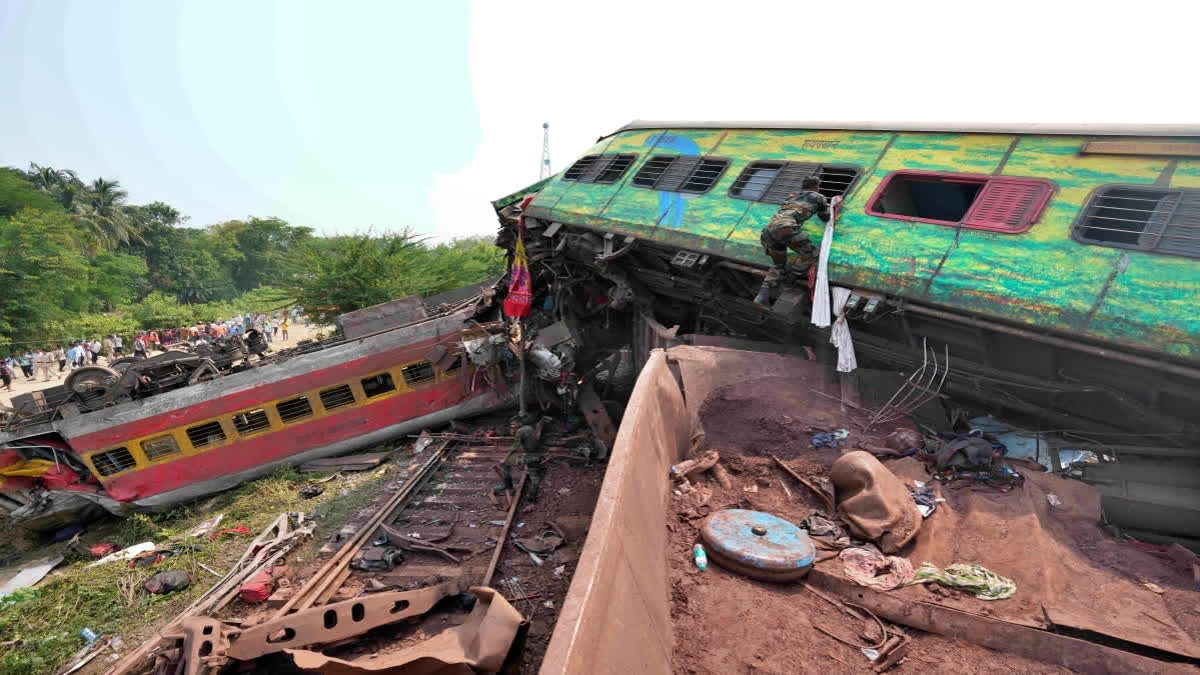Hyderabad: Nearly 48 hours after the Odisha triple train accident, the railways is yet to come out with a detailed statement on what caused the horrendous mishap. However, a Comptroller and Auditor General of India (CAG) in its 2022 report on 'Derailments in Indian Railways' had flagged several serious lapses in railway safety, including non-utilisation of a dedicated railway fund on priority tasks, the declining trend in funding track renewal and inadequate staffing in safety operations.
The CAG report, a copy of which was accessed by ETV Bharat, also flagged shortcomings in inspections and failure to submit or accept reports after the accidents. It also pointed out that inadequate staffing in safety operations was a serious concern. The train mishap in Odisha, which occurred on Friday evening, has claimed the lives of 275 passengers and over 1,100 were injured.
Also read: Train accident: Unclaimed dead bodies create space problems in Odisha's morgues
The CAG had made two key recommendations, including that the railways should ensure strict adherence to the scheduled timelines for conducting and finalisation of accident inquiries and that it may develop a strong monitoring mechanism to ensure timely implementation of maintenance activities by adopting fully mechanised methods of track maintenance and improved technologies.
Here are the key CAG observations highlighting the shortcomings in Indian railways
- Shortfalls were ranging from 30 to 100 per cent in inspections by track recording cars required to assess the geometrical and structural conditions of railway tracks.
- The Track Management System (TMS) is a web-based application for online monitoring of track maintenance activities. The in-built monitoring mechanism of the TMS portal was, however, not found to be operational.
- From April 2017 to March 2021, a total of 422 derailments were attributable to the Engineering Department. The major factor responsible for derailment was related to ‘maintenance of tracks’ (171 cases), followed by ‘deviation of track parameters beyond permissible limits’ (156 cases).
- The number of derailments attributable to the ‘Mechanical Department’ was 182. Defects in ‘wheel diameter variation and defects in coaches/wagons’ were the major contributor (37 per cent) to the factors responsible for derailments.
- The number of accidents attributable to the ‘Loco Pilots’ was 154. ‘Bad Driving/Over speeding’ was the major factor responsible for derailments.
- The number of accidents attributable to the ‘Operating Department’ was 275. ‘Incorrect setting of points and other mistakes in shunting operations’ accounted for 84 per cent.
- In 63 per cent of cases, the ‘inquiry reports’ were not submitted to the accepting authority within the prescribed schedule. In 49 per cent of cases, there was a delay in the acceptance of the reports by accepting authorities.
- Most of the derailments occurred due to simultaneous failures of each of the five barriers namely (i) Rules and Joint Procedure Orders (JPOs), (ii) Training/Counselling of staff, (iii) Supervision of operations (iv) Coordination and communication between staff of different departments and (v) Scheduled inspections
- The allotment of funds for track renewal works declined from Rs 9,607.65 crore (2018-19) to Rs 7,417 crore in 2019-20. The funds allocated to track renewal works were also not fully utilised. Out of 1,127 derailments during 2017-21, 289 derailments (26 per cent) were linked to track renewals.
- The overall expenditure on priority-I works from Rashtriya Rail Sanraksha Kosh (RRSK) showed a declining trend from 81.55 per cent in 2017-18 to 73.76 per cent in 2019-20.


